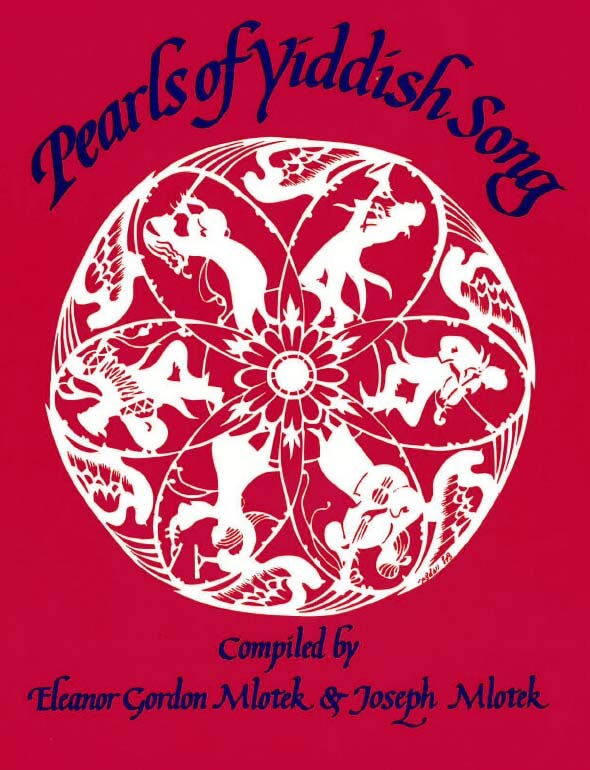Originally titled “A mentsh zol men zayn” (One should be a decent person), the song was the name of an operetta in 1908. It was published in sheet music by A. Teres, N.Y., the same year. Words by Anshel Schorr (1871-1942); music by Arnold Perlmutter (1859-1953) and Herman Wohl (1877-1938). Popularized by such famous actors as Boris Thomashefsky and Lazar Fried, the song was sung in many cities and towns in Eastern Europe as well.

Look at a man when he is rich, how he enjoys himself.
He thinks no one is his equal and that money is everything.
He thinks that since he’s a rich man, he deserves a lot of respect.
And the proud fool doesn’t understand that money is round and rolls.
Today it’s with me and tomorrow with you and later with four others.
Refrain:
You shouldn’t boast about money.
It can be easily lost, and then you first feel the bitter taste of the poor man.
If you want to leave a good name after your death, give up your vain snobbery.
Just be a decent person.
Little man, when things go well, and you’ve wealth beyond all means, don’t forget the duty which is upon you:
When a poor man comes to your house, don’t let him leave empty handed, you can’t foresee what may happen to you at some time.
Today it seems predestined, you still have value, and tomorrow it can be just the opposite.
I have already seen a man as rich as Croesus.
He was proud and evil, persecuted people a lot.
Then another time came, the wheel turned.
Today you can see the proud rich man as he begs:
— Give me alms! He suffered more, died in hardship and lies in borrowed shrouds.
Batrakht dem mentsh ven er iz raykh,
Vi er nor brent a velt;
Er meynt az keyner iz im glaykh,
Az ales iz nor dos gelt.
Er meynt az koym iz er nor a gvir,
Kumt im shoyn zeyer fil koved dafir,
Un der shtoltser nar nit farshteyt
Az gelt iz dokh rund un es geyt.
Haynt iz es bay mir,
Un morgn bay dir,
Un shpeter bay andere fir.
Refrain:
Mit gelt tor men nit shtoltsirn,
Men ken es laykht farlirn,
Dan ersht ken men filn
Dem bitern tam
Fun dem oreman.
Vilstu a nomen dervarbn,
S’zol blaybn nokh dayn shtarbn,
Varf avek kayn pustn yikhes,
A mentsh zolstu nor zayn.
Mentshele, ven dir geyt gut,
Un du bist raykh on a shir,
Gedenk zhe un farges nor nit,
Di flikht vos ligt nokh oyf dir:
Az ven an oreman kumt in dayn hoyz,
Leydik loz im fun dayn shtub nit aroys,
Vayl du kenst foroys dos nit zen,
Vos a mol ken mit dir oykh geshen.
Haynt iz dir bashert,
Hostu nokh a vert,
Un morgn ken zayn gor farkert.
Ikh hob shoyn a mol gezen,
A man vi Koyrekh raykh,
Shtolts un shlekht iz er geven,
Geroydeft mentshn a sakh.
Dan iz gekumen an ander tsayt,
Dos redele hot zikh ibergedreyt.
Haynt zet men dem shtoltsn gvir,
Vi er bet: — a nedove shenkt mir!
Gelitn nokh mer,
Geshtorbn ‘zoy shver,
In fremde takhrikhim ligt er.
באַטראַכט דעם מענטש װען ער איז רײַך,
װי ער נאָר ברענט אַ װעלט;
ער מײנט אַז קײנער איז אים גלײַך,
אַז אַלעס איז נאָר דאָס געלט.
ער מײנט אַז קױם איז ער נאָר אַ גבֿיר,
קומט אים שױן זײער פֿיל כּבֿוד דאַפֿיר,
און דער שטאָלצער נאַר ניט פֿאַרשטײט
אַז געלט איז דאָך רונד און עס גײט,
הײַנט איז עס בײַ מיר,
און מאָרגן בײַ דיר,
און שפּעטער בײַ אַנדערע פֿיר.
רעפֿרײן:
מיט געלט טאָר מען ניט שטאָלצירן,
מען קען עס לײַכט פֿאַרלירן,
דאַן ערשט קען מען פֿילן
דעם ביטערן טעם
פֿון דעם אָרעמאַן.
װילסטו זיך אַ נאָמען דערװאַרבן,
ס’זאָל בלײַבן נאָך דײַן שטאַרבן,
װאַרף אַװעק דעם פּוסטן ייִחוס,
אַ מענטש זאָלסטו נאָר זײַן.
מענטשעלע, װען דיר גײט גוט,
און דו ביסט רײַך אָן אַ שיעור,
געדענק זשע און פֿאַרגעס נאָר ניט,
די פֿליכט װאָס ליגט נאָך אױף דיר:
אַז װען אַן אָרעמאַן קומט אין דײַן הױז,
לײדיק לאָז אים פֿון דײַן שטוב ניט אַרױס,
װײַל דו קענסט פֿאָרױס דאָס ניט זען,
װאָס אַ מאָל קען מיט דיר אױך געשען.
הײַנט איז דיר באַשערט,
האָסטו נאָך אַ װערט,
און מאָרגן קען זײַן גאָר פֿאַרקערט.
איך האָב שױן אַ מאָל געזען,
אַ מאַן װי קורח רײַך,
שטאָלץ און שלעכט איז ער געװען,
גערודפֿט מענטשן אַ סך.
דאַן איז געקומען אַן אַנדער צײַט,
דאָס רעדעלע האָט זיך איבערגעדרײט.
הײַנט זעט מען דעם שטאָלצן גבֿיר,
װי ער בעט: — אַ נדבֿה שענקט מיר!
געליטן נאָך מער,
געשטאָרבן ‘זױ שװער,
אין פֿרעמדע תּכריכים ליגט ער.
Song Title: Mit Keyn Gelt Tor Men Nit Shtoltsirn

First published in 1988 as Pearls of Yiddish Song: Favorite Folk, Art and Theatre Songs, this anthology contains 115 songs. Some material had never been published, while others, included in rare song collections or sheet music, were largely inaccessible. The songs presented reflect Jewish life in Eastern Europe and the United States and depict childhood, love, family celebrations, poverty, work and struggle. There are also songs from the Hasidic and Maskilic movements, songs of Zion and of America, as well as songs from the Yiddish theater.
The title of this anthology derives from the weekly two-page feature column “Pearls of Yiddish Poetry,” which the compilers Yosl and Chana Mlotek initiated in 1970 in the Yiddish newspaper Der Forvertz (the Yiddish Daily Forward). Hundreds of readers from around the world — including authors, composers, singers, actors — became co-participants in this collective folk project and recalled melodies, lines, fragments, stanzas and their variants of songs, poems, and plays which they had heard in their youth. At first, readers sent in only written material. Later, they also taped songs on cassettes, many of whose melodies had, until then, never been recorded. They also identified and supplied missing information regarding lyricists, poets, and composers and described the circumstances surrounding the songs’ origins, their dissemination, diffusion and impact.